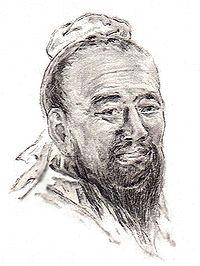Zhuangzi
2009-08-05 16:55 BJT
Life
Zhuangzi allegedly lived during the reign of King Hui of Liang and King Xuan of Qi, in the span from 370 to 301 BCE. Zhuangzi was from the Town of Meng (蒙城, Méng Chéng) in the State of Song (now Shāngqiū 商丘, Henan). His given name was Zhou (周, Zhōu). He was also known as Meng Official, Meng Zhuang, and Meng Elder.
 |
| Master Chuang |
The validity of his existence has been questioned. Russell Kirkland writes, "According to modern understandings of Chinese tradition, the text known as the Chuang-tzu was the production of a 'Taoist' thinker of ancient China named Chuang Chou. In reality, it was nothing of the sort. The Chuang-tzu known to us today was the production of a thinker of the third century CE named Kuo Hsiang. Though Kuo was long called merely a 'commentator,' he was in reality much more: he was the actual creator of the 33-chapter text of Chuang-tzu ... Regarding the identity of the original person named Chuang, there is no reliable historical data at all."
Zhuangzi's philosophy
In general, Zhuangzi's philosophy is mildly skeptical, arguing that life is limited and the amount of things to know is unlimited. To use the limited to pursue the unlimited, he said, was foolish. Our language and cognition in general presuppose a dao to which each of us is committed by our separate past—our paths. Consequently, we should be aware that our most carefully considered conclusions might seem misguided had we experienced a different past. "Our heart-minds are completed along with our bodies." Natural dispositions to behavior combine with acquired ones—including dispositions to use names of things, to approve/disapprove based on those names and to act in accordance to the embodied standards. Thinking about and choosing our next step down our dao or path is conditioned by this unique set of natural acquisitions.
Editor: Zheng Limin | Source: CCTV.com
 Mail
Mail Share
Share Print
Print


 Video
Video









 2009 China Central Television. All Rights Reserved
2009 China Central Television. All Rights Reserved